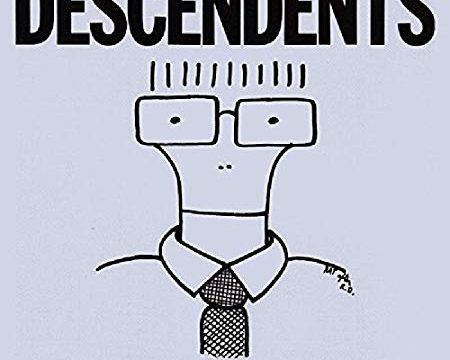One of the pleasures of hardcore punk is when the band in question takes a pummeling two minute long (or sometimes forty five seconds) song to an unusual and unexpected place. “Bikeage” off Milo Goes To College is a prime example as Descendents guitarist Frank Navetta opens with a riff that’s downright…jangling? Tony Lombardo’s subdued bass joins him in creating a poignant opening before the group flies into fast, flying kiss-off mode. “Who’s gonna pick you up, and take you home tonight? Not me,” the singer calls out as the band finds that creative, locked-in unity of sound you can only get from time and ease playing together awhile.
I used to listen to that one while walking around the Richmond District of San Francisco, ruing my circumstances at nineteen and being not just socially awkward, but angry. My disability and outsiderdom, as well as inability to talk to women, meant I had a lot of rage in me that was often simmering just beneath the surface. For years my response was to immerse myself in all kinds of super quick, short punk and hardcore bands of the past and present, in addition to going to shows, making friends in the scene, and being the front man in a hardcore band. (Dead Set!) Bands like The Descendents were a part of my everyday, with Milo Goes To College standing as the highlight of their discography.
Milo was named for singer Milo Aukerman’s actual heading to San Diego for college after the recording and putting the group on semi-hiatus. Original player Navetta would also leave after this album to become a professional fisherman, though he’d work with the band later for Everything Sucks. Recorded for Mike Watt and D. Boon’s label New Alliance with (in)famous SST engineer Spot, this first album cemented the band as a major part of the SoCal punk scenes. Like labelmates Husker Du, they played angsty, coffee-fueled hyperactive hardcore backed by real pop melodies and instincts; both groups would acknowledge a love of the Beatles that transcended the proto-“OK Boomer” divisions of punk. Husker Du’s brooding choruses would eventually create emo whereas the Descendents, absolute nerds and angry straight guys, unwittingly sparked a subgenre of self-loathing, goofy pop punk whose legacy would range from the Ergs to (shudder) Blink-182.
Re-listening to Milo Goes To College years after it held real importance in my life was a jarring experience of course, like finding a graphic tee I’d worn every other day in 2010. The humming bass lines and Milo’s always hoarse, prickly vocals on “Myage” still hit the pleasure centers of my brain though. Remembering the grooving anger of “Parents” was a thrill too. I soon found myself tapping back into that surf-influenced, agitated punk sound and feel, the sense of being young and everything being either an offense or absolutely exhilarating. The lyrics of drummer Bill Stevenson and co. are by turns heartbroken, entitled, and brimming with the self-righteous resentment of the male geek. “Hope”’s verses are from the confident, menacing POV of a Nice Guy waiting in the wings for his chance: “My day will come/Someday I’ll be the only one/Cause I’ve got you/you don’t stand a chance.” Other songs like the stomping anthem “Suburban Home” are seemingly sarcastic invective towards parents, suburbia, and the targets of the riled kid who’s got it all figured out. (Though apparently bassist Lombardo wrote “Suburban Home” and lines like “I don’t want no hippie pad/I want a home just like Mom and Dad!” with absolute sincerity.) The whole record shakes with catchy, violent fury.
Where the album now gives me pause is in the often gynophobic and sexist lyrics. Even “Bikeage”, whose opening may be my favorite of any punk song, is the verse of a guy wagging his finger and slut shaming the teenage girls drinking and doing drugs. “Kabuki Girl” is a gross Orientalist love song for the local Japanese girl at the cafe: “Girls from the East are the best/They got more of what I’m looking for.” The women on this album are things to be loved, grieved for, or dismissed as sluts and junkies by the nerds unable to see them outside of a possessive envy. The Descendents weren’t the only punk band thinking in those terms obviously, but that particular slant of entitled geekdom has been a permanent feature of the bands who followed their four-eyed foosteps and of pop-punk generally. (I haven’t even mentioned Milo accusing a guy wearing tight pants of being a “fucking homo”. I knew that was off even then.)
Nowadays the Descendents haven’t been something I’ve listened to much since 2012 or 2013, along with most punk bands under the sun. What the hell happened? For one I got my heart broken badly, started dating and as it turns out was good at it once I got some confidence and saw women more as human beings. I began to make more friends outside the scene and while I’ve been in and out of music since first singing live, I also rarely if ever go to actual punk shows. After my first band broke up, the heartbreak, depression, and some therapy, my obsession with punk as a genre and subculture slackened almost completely. I’d never fit very comfortably into the strict cultural demands of hardcore anyway, and the truth was I just wasn’t that enraged as an individual anymore outside of politics. Despite the title of the Descendents second record being I Don’t Want To Grow Up, I’d done just that.
While I’d now categorize Milo Goes To College as something of a “problematic fav”, it’s still got that scrappy fervor all the great hardcore punk albums have, that hunger to articulate the violent feelings churning inside. That’s what I get now out of these fifteen songs in twenty-two minutes, out of the sublime wistfulness of “Bikeage”’s opening chords, out of punk and rock n’ roll: the mystic, unadulterated poignance and pain of being young.

